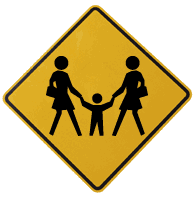
Image: Laura Shapiro
The breakup of Kathleen Crandall’s family followed a sadly familiar pattern. After she and her partner of six years split up in 1990, Crandall, a Berkeley, Calif.-based real estate broker, continued to act as a parent to the two kids they had raised together, then aged eight and three — driving them places, enrolling them in dance and karate lessons. “I would’ve had them every day if I could’ve,” says Kathleen.
But after a few years, Kathleen and her ex-partner had a falling out, and her partner, with whom the children live, ended their co-parenting arrangement. Kathleen spent a year calling and begging to see her girls. Upon learning that the kids were sneaking out to see Kathleen, her ex-partner took out a restraining order against Kathleen.
So Kathleen took her to court. “All I was asking was to be treated like any other parent,” she says. “Send us to mediation like anyone else.”
The twist in Kathleen’s story is that her ex-partner is a woman. Since it was her ex-partner who bore the children, Kathleen has no biological connection to them — and under the law, as half of a same-sex couple she had no legal right to help raise or even see them.
Several lawyers donated their services for the case, says Kathleen, which otherwise would have cost her about half a million dollars. Nonetheless, she lost, and hasn’t seen her daughters in four years.
But across the country, those laws are starting to change. A growing number of court decisions are redefining parenthood, giving “psychological parents” like Kathleen long-denied rights. And gays and lesbians aren’t the only ones trying to benefit from the decisions — extended family members have also gone to court to claim parental status, and the rights that go with it.
Though such cases have been around since the early ’90s, no state recognized “psychological parents” until 1995 when the Wisconsin Supreme Court gave Elsbeth Knott the right to seek visitation with her child, whom she had helped raise from birth. Wisconsin stood alone for four years. But since 1999, four significant cases — in Massachusetts, New Jersey, and Rhode Island — have recognized psychological parenthood. Similar cases are currently being heard in courtrooms in New York and Pennsylvania. As a result, domestic partners, aunts and grandparents are beginning to get some of the clout given to traditional parents in visitation and custody disputes.
“Before 1999, it seemed like the bulk of the cases were an uphill battle, and we had very little precedent to rely on,” says Leslie Cooper, a staff attorney at the ACLU Lesbian and Gay Rights Project. “All of a sudden the tables have turned.”
Most of those cases have only granted visiting rights to psychological parents. But the New Jersey Supreme Court upped the ante in April of 2000, by declaring that once psychological parenthood is established, both parents are to be treated like any divorcing couple — in both visitation and custody disputes. “Up until then if you’d asked me if these [decisions] applied to custody, I would’ve said ‘not clear,'” says Cooper.
So far, most such cases have involved gay and lesbian couples. Kate Kendell, executive director of the National Center for Lesbian Rights estimates that anywhere from 3 to 12 million children are being raised by lesbian or gay parents in the United States, and the number is growing. “It’s been a red line going off the chart for the last five years,” Kendell says. As an attorney in the thick of these families’ disputes, she says, it is also clear that the number of those couples splitting up and at odds over children is growing.
Family law attorney Carol Gapan, whose firm has handled some half-dozen cases between same-sex couples in the last five years, says the court rulings are having an impact on the way couples treat disputes over children. “People are less likely now to deny visitation,” she says. “After a same-sex couple splits up now, the other partner has a sort of hammer.” Growing numbers of same-sex parents are also preparing for the worst by writing co-parenting contracts promising each other certain rights in the event of a breakup in the early stages of their family, says Gapan.
Same-sex couples aren’t the only ones making the case for “psychological parenthood.” Gapan is using the Wisconsin case to argue on behalf of two grandparents in that state. And in Massachusetts, seven days before deciding a case between two lesbians, the Supreme Judicial Court affirmed visitation rights for a maternal aunt.
Critics argue that these rulings open a Pandora’s box that might ultimately allow anyone who bonds with a child — a nanny, teacher, or mentor — to claim parenthood. “Under this analysis, any domestic partner, caregiver, or nanny who has bonded with the child could obtain visitation rights,” said Justice James P. Lynch in his dissent to the Massachusetts case. “Furthermore, under this standardless principle, what would prevent a court from ordering visitation with a religious leader, teacher, mentor, or friend if the judge perceived it to be in the best interests of the child?”
In fact, most of the decisions do set criteria, like living in the same house and receiving no salary for caring for the child, to limit those who qualify. In New Jersey, for example, a lesbian woman recently lost her bid to gain visitation rights to a girl she helped raise because the court ruled that she had not met the standard for psychological parenthood. Still, says attorney Edward O’Donnell, abuse of the concept “is one of the problems there will be in the future.”
So far, however, the vast majority of these cases involve gay and lesbian parents. For them, says O’Donnell, the growing sympathy of the courts “gives a stamp of approval on other than the nuclear family, and affirms a child’s right to have a loving and caring relationship with anyone.”















